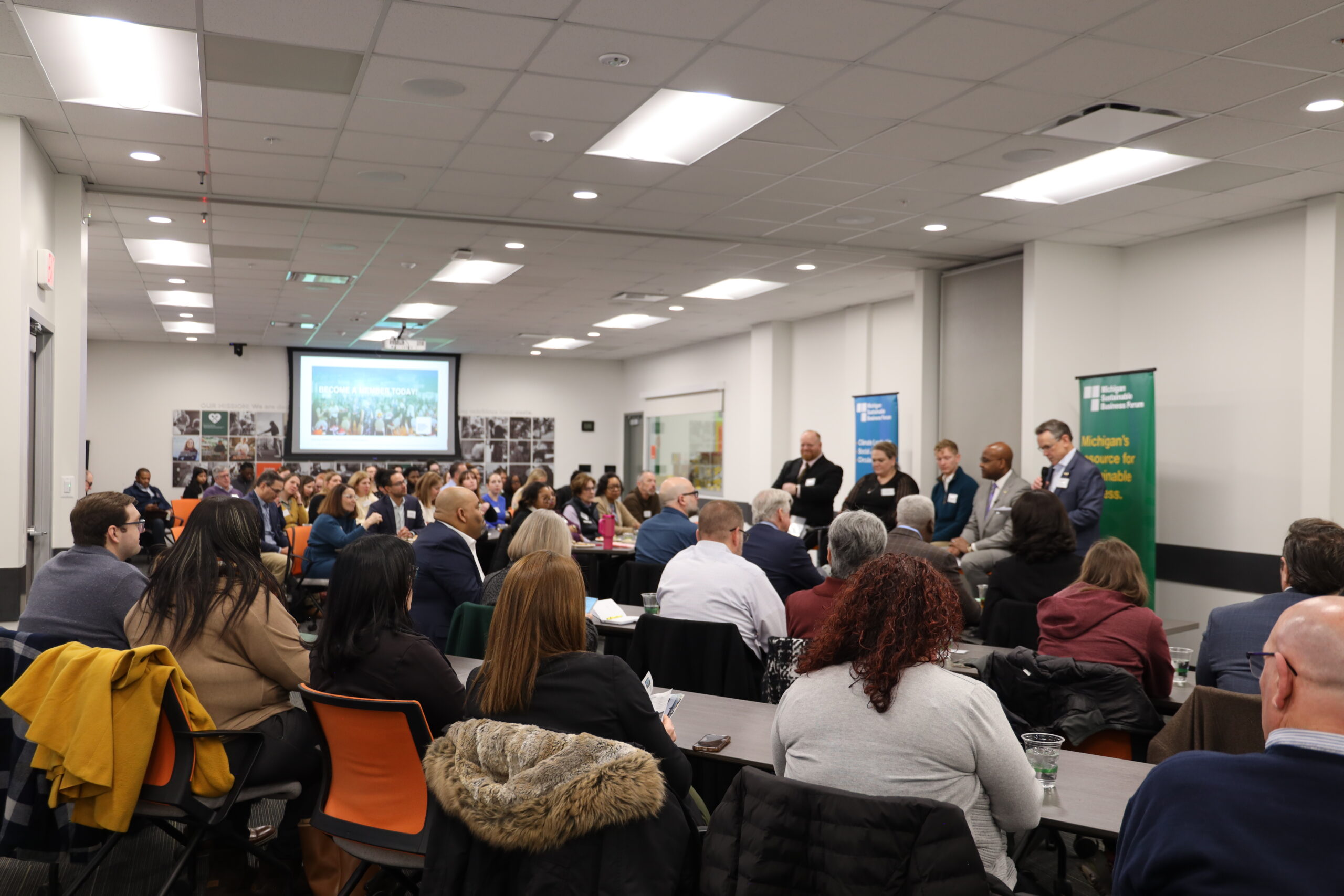
Transforming Food Waste into Opportunity: Michigan’s Path to a More Sustainable Food System
February 5, 2025
Michigan Sustainable Business Forum (MiSBF), in partnership with Forgotten Harvest, hosted the Reducing Hunger, Building Climate Leadership: The Future of Food Rescue in Michigan event, bringing together nearly 100 experts from the public and private sectors to explore new strategies for reducing food waste while strengthening food security. Leaders, including Daniel Schoonmaker (MiSBF), Hannah Hoskins (Lineage Foundation), Adrian Lewis (Forgotten Harvest), and Jonathan Mallek (Michigan Department of Agriculture and Rural Development, MDARD), shared insights on how businesses, policymakers, and nonprofit organizations can work together to create a more resilient food system.
Strengthening Hunger Relief Through Food Rescue
Food rescue plays a critical role in reducing waste and ensuring surplus food reaches those in need. Adrian Lewis, CEO of Forgotten Harvest, emphasized the importance of recovering food from restaurants, processors, and retailers and distributing it through community partnerships. By leveraging data-driven decision-making, organizations can better allocate resources and minimize unnecessary waste.
Hannah Hoskins, Executive Director of the Lineage Foundation, highlighted advancements in food preservation technology, such as patented innovations that extend shelf life and reduce spoilage. Her team is working to streamline food donations by helping businesses move surplus food efficiently through their supply chains.
Jonathan Mallek, MDARD’s Policy Advisor, stressed the importance of strengthening food supply chains and replicating successful food waste recovery programs to ensure long-term sustainability in Michigan’s food system.
The Role of Businesses in Food Security
Businesses have a unique opportunity to drive food security through investment in technology, logistics, and strategic partnerships. Hoskins urged businesses to take bold risks and invest in innovation, while Lewis pointed out that simple solutions—like utilizing volunteer networks and personal vehicles for food transport—can have a tangible impact.
Mallek added that identifying gaps in the food system is essential. Collaboration across industries can help bridge these divides, ensuring food reaches its intended recipients.
Unlocking Michigan’s Food Waste Potential
Food loss and waste prevention represent a $1 billion opportunity for Michigan’s farms and food manufacturers. Each year, vast amounts of food are lost across supply chains, but strategic solutions can turn this waste into economic and environmental benefits. The panel explored key opportunities, including:
- Tax incentives for food donations to encourage greater participation from businesses.
- Urban agriculture initiatives to shorten supply chains and reduce waste.
- Upgrading food processing equipment, such as dehydrators, to extend food usability.
- Attracting food manufacturers to increase Michigan’s food storage capacity and strengthen local food systems.
Breaking Barriers to Food Rescue
One of the biggest challenges in food donation is public perception and liability concerns. Many businesses hesitate to donate due to fear of legal risks or reputational harm. Hoskins noted that outdated food labeling practices—such as misleading “Sell By” dates—contribute to unnecessary waste. A simple shift to “Best if Used By” labeling could make a significant difference in consumer confidence and reduce edible food waste.
Additionally, Michigan’s landfill tipping fees remain low, making it cheaper for businesses to dispose of food than to invest in sustainable solutions. Addressing these structural challenges is essential to making food rescue a mainstream practice.
Building a Sustainable Future
Michigan Sustainable Business Forum has partnered with Make Food Not Waste and the Michigan Department of Environment, Great Lakes, and Energy (EGLE) to create the Michigan Food Waste Roadmap, a comprehensive strategy to cut food waste in half. As Schoonmaker puts it, “If we want to cut food waste in half, we need to double our solutions.” The Roadmap is a call to action for businesses, policymakers, and community leaders to rethink food systems and build a future where waste is minimized, and food security becomes a reality.
As Hoskins reminded us, “Food is everything—it brings people together.” Michigan can lead the way in creating a food system that works for everyone. through innovation, collaboration, and a shared commitment to sustainability.
Learn more about MiSBF’s Michigan Food Waste Roadmap, visit www.misbf.org/michigan-food-waste-policy-road-map
